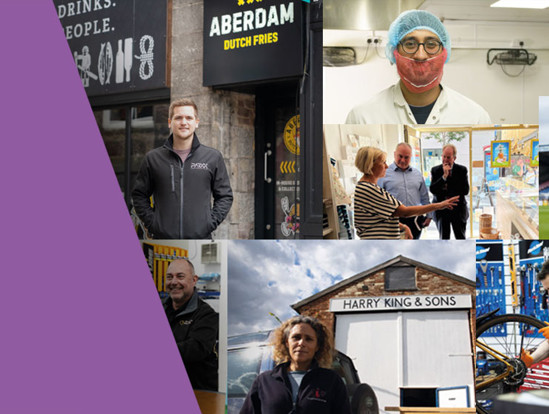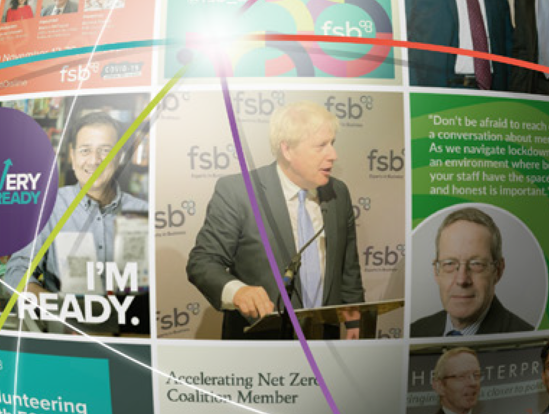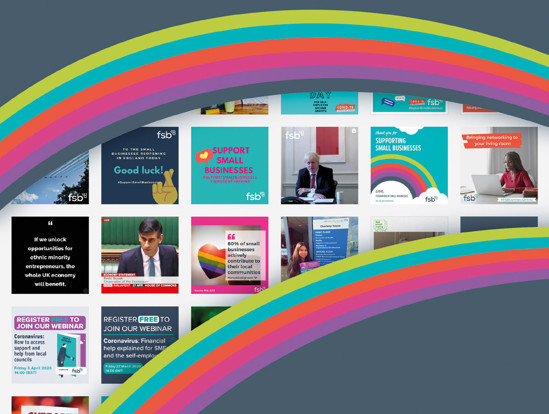Foreword
Message from the National Chair and Vice Chairs
Entrepreneurship is the route to the UK’s economic recovery.
Supporting the UK’s 5.5 million small businesses and self-employed was crucial during this financial year, as we emerged from the on-off restrictions of the pandemic straight into the headwinds of a cost-of-doing-business crisis.
Giving a voice to small business owners heard by political decision-makers and influencers was at the forefront of FSB’s work and mission. This was essential as our members faced a growing storm of high taxation, rising inflation, soaring energy bills, and shortages of workers and skills.
Through highly effective political engagement and strategic media relations, FSB changed the narrative of a ‘cost-of-living crisis’ affecting households to a recognition that a cost-of-doing-business crisis was also sweeping through the economy and causing hardship for small business owners.
Our campaigning secured an important win in a reversal of the National Insurance hike for employers, the self-employed and employees. We successfully made the case that this tax rise would negatively hit jobs, growth, enterprise, and, ultimately, economic recovery; and we also called for this cut to be expanded to limited company directors. We also secured an increase in the Employment Allowance, from £4,000 to £5,000 per year.
As the energy price crisis developed, we worked hard to ensure the focus was not just on the impact on domestic consumers, but also on small businesses which, unlike households, previously had no protection from a price cap. This resulted in us securing from the Government the Energy Bill Relief Scheme to help small firms.
For those small businesses able to take steps towards alternative, greener, forms of energy supply, our campaigning ensured a change to Business Rates rules which meant small business owners would no longer be penalised with higher rates bills for these improvements to premises. The Chancellor accepted the proposal and credited FSB for it, which had been one of the headline asks in our policy report Accelerating Progress on the Path to Net Zero, launched to coincide with the COP26 environmental summit in Glasgow. Alongside this, we launched an online sustainability hub, with a wealth of practical guidance and resources.
Paving the way to economic recovery required pro-growth policies from Government, including addressing skills gaps and skills opportunities, both in the workforce and among small business owners. Our Scaling Up Skills report included several recommendations around apprenticeships and technical education which landed well with both political decision-makers and stakeholders. We also secured a change in the Office for Students’ definition of a ‘good outcome’ for graduates to include those starting their own business.
A flagship of this year was our Business without Barriers policy report on health and disability which was followed by a Business Without Barriers digital hub, campaign and events providing information and inspiration both from a business-owner and employer perspective. In response to member demand, FSB also launched the UK’s first ever online LGBT+ business hub, featuring member stories, videos and employer resources.
Our members, their needs and experiences underpin our role as the leading advocate for small businesses and the self-employed, and our Big Voice survey programme continued to be instrumental in providing hard evidence to influence our campaigning and external affairs activity.
The business itself made significant investments to ensure it remains the go-to organisation for
business support and expertise long into the future. Our business support services continued to be a key part of how our members ran their businesses through these challenging times,
providing value for money when it was most needed. This was complemented by an extensive programme of networking and learning events both locally and nationally.
Our volunteers also play a pivotal part in giving small businesses a voice, as well as being champions for our business and our community of entrepreneurs. Some of our volunteer structures were enhanced to ensure that FSB continues to effectively represent the millions of small business owners in all parts of the UK. The Board itself is subject to a scrutiny body.
In the last year, the Board established a new ESG Committee to give prominence to environmental, social and governance matters and, in the wake of the war in Ukraine, and after consultation, FSB designated the Disasters Emergency Committee (DEC) as this year’s official Chair’s Charity.
Chief Executive’s Report
The financial year October 2021 to September 2022 has been challenging for all businesses, including our members. Despite this, FSB delivered on creating a financial climate which ensures best value for members and safeguards FSB for the future.
During the year, income from subscriptions and joining fees remained FSB’s most significant source of revenue, and member retention rates were high. Recognising how difficult the economic climate has been for members there was no rise in subscription rates in this our second year without an increase.
Administrative costs increased in the year, mainly because of a large-scale programme to develop FSB’s operating systems to support the continuing modernisation of the business.
We also moved our Westminster teams into new office facilities and invested in development of our previous office building to house a managed flexible workspace operation. The investment property was revalued in the year, creating a revaluation gain of circa £1.9m. Overall, FSB has generated a surplus in the year, and reserves increased by £0.7m.
Considerable investment in management information and business intelligence solutions were made to facilitate improved data-driven decision making. As implementation continues, the business will be able to develop reports and visual analytics based on new operational data sources, sales and retention performance data and member survey results.
New contact centre technology strengthened our delivery of more than 285,000 interactions with members and prospective members across voice, email, live chat and social media. Customer satisfaction met a consistent score of 97 per cent.
Creating strong relationships with small business owners and the self-employed is at the heart of FSB’s business model. Our market is made up of a diverse group of people in almost every sector and from almost every background imaginable. Each has a unique personal story, circumstance, and ambition but they, like all our members, have one thing in common – they are small business owners or self-employed. It is this common ground that is apparent when we function as one collective. It is delightful to observe how our community share their passions and experiences with one another at our many hundreds of networking, learning and awards events as well as at our roundtables and focus groups.
The new members that join us each year, as well as the tens of thousands that are proud to stay part of FSB, do so in no small part because of the very personal relationships that are formed with FSB through our membership advisors, all of whom are themselves small business owners. This puts them in a unique position to illuminate the benefits of FSB membership to their contemporaries.
The B2B market is a competitive space, and our brand needs to work hard to be distinctive. The cost-of-living and ‘cost-of-doing-business crisis’, a term that was coined by our Westminster media and communications team, has meant that small businesses have had to make difficult and measured decisions on what they invested their money in over the last year.
Never has it been more important for our business to offer unequalled value to our members, so they see some tangible outcomes to investing in FSB membership. FSB Legal remained the most used member service in the last financial year, with over 100,000 calls to the legal helpline and more than 200,000 downloads. Many find our employment advice and support invaluable. Small firms in the UK employ more than 16 million people, but lots of them, especially microbusinesses, do not have an in-house human resources function and so having expertise through FSB membership is vital to them. FSB Debt Recovery, which we introduced in June 2020, had recovered £1,621,160 for our members by the end of September 2022. One member alone recovered £149,000 of debt from the service.
Policy and advocacy remain at the core of FSB. We are the trusted voice of 5.5 million small business owners and the self-employed, heard by those in power. The wins we secure from politicians and other key decision-makers at every level rely upon evidence from our members, and expert policy analysis of issues and new ideas. A smart public affairs and media strategy, within a fast-changing political environment, builds on our trusted reputation to achieve public policy change.
Independent benchmarking research conducted with primary political audiences finds that 94 per cent are familiar with FSB – more than any of our competitors. Brand awareness is equally high across the major political parties and MPs are most likely to be favourable towards FSB in comparison to any competitors.
FSB itself has needed to be competitive in attracting and retaining skilled staff and we improved our equality diversity and inclusion (EDI) footprint to recruit from the widest pool. We signed the Menopause Workplace Pledge, continued employee mental health first aid training and launched a new employee package for staff that serve in the British Reserve Forces – gaining an award from the Defence Employer Recognition Scheme (ERS), and we enhanced our maternity, paternity and adoption leave package for staff.
Over the year, we proactively reduced our energy consumption, and investment in robust digital communication technology has allowed a noticeable reduction in travel whilst increasing efficiency. We improved waste management and recycling and introduced new processes that factor in carbon foot printing when sourcing goods and services. We’re committed to upgrading lighting, heating and ventilation systems to maximise energy efficiency and we look towards best practice energy saving for refurbishment projects on our property.
Highlights
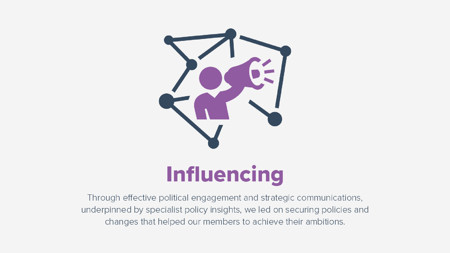
Influencing
Through effective political engagement and strategic communications, underpinned by specialist policy insights, we led on securing policies and changes that helped our members to achieve their ambitions
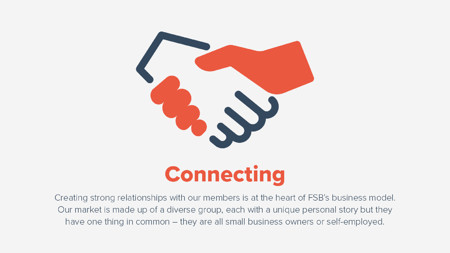
Connecting
Creating strong relationships with our members is at the heart of FSB’s business model. Our market
is made up of a diverse group, each with a unique personal story but they have one thing in common – they are all small business owners or self-employed.
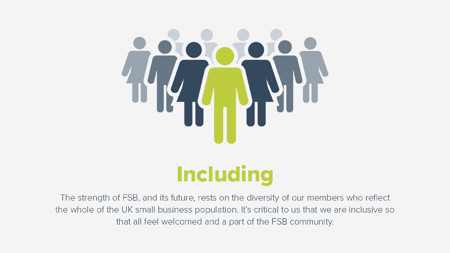
Including
The strength of FSB, and its future, rests on the diversity of our members who reflect the
whole of the UK small business population. It’s critical to us that we are inclusive so that all feel
welcomed and a part of the FSB community.
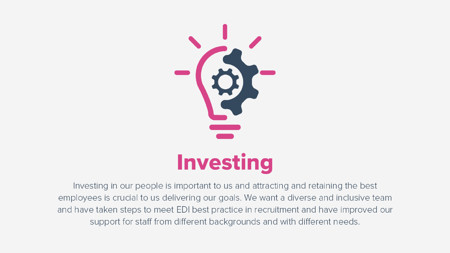
Ivesting
Investing in our people is important to us and attracting and retaining the best employees is
crucial to us delivering our goals. Over the last financial year the market has become more
competitive. We want a diverse and inclusive team and have taken steps to meet EDI best
practice in recruitment and have improved our support for staff from different backgrounds
and with different needs.
To read the report online, click here, or download the complete document below.
Download the full report
To download and read the full report including accounts and overviews click below:


